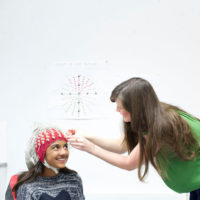ADHD
-

Can physical exercise improve tics and associated mental health difficulties in Tourette syndrome? The jury is out
Physical exercise is increasingly being recommended as part of management for children and young people with mental health problems. There is a growing evidence base that shows physical exercise is associated with improvements in functioning for conditions such as attention deficit hyperactivity disorder (ADHD), although studies are small, they are signifcant.
Read more -

Improvements of adolescent psychopathology after insomnia treatment: Results from a randomized controlled trial over one year.
Many adolescents experience sleep problems, which can be caused by hormonal changes during puberty, and social changes with increasing complexity of daily life while growing up.
Read more -

Routine screening is needed to identify language problems in children with ADHD
In 2017, Emma Sciberras and colleagues conducted a Research Review for the Journal of Child Psychology and Psychiatry to rigorously analyse how common are language problems in children with Attention-Deficit Hyperactivity Disorder. Here, the researchers discuss their main findings and explain why they consider that a screen for language function would be a valuable addition to current ADHD assessments.
Read more -

Depression is highly prevalent but under-reported in children with ADHD
Researchers at Cardiff University have investigated whether the symptoms of depression observed in patients with attention-deficit/hyperactivity disorder (ADHD) differ from those reported in the general population.
Read more -

ADHD screens: look into language
A literature review of language problems in ADHD has confirmed large deficits in multiple areas of language functioning among young people with the disorder.
Read more -

Telephone support for parents in ADHD
Due to its high prevalence, treating ADHD can place a burden on services. Self-help and remote interventions could offer a way to deliver treatment at scale, if they’re effective.
Read more -

Brain firing, but not wiring, is different in children with ADHD
When in a relaxed state, the brains of children and adolescents with ADHD tend to fire differently to those without the disorder, although there don’t seem to be changes in the physical connections or ‘wiring’ of their brains.
Read more -

The SAAND Study: Attention and arousal regulation in neurodevelopmental disorders
The SAAND Study – An investigation into the role of attention and arousal regulation in ADHD and ASD, and comorbidity between these disorders
Read more -

Toughened toddlers seek rewards & Toddlers’ temperament is autism early indicator
Two overviews of papers focusing on toddlers. The first on those who grow up in a harsh environment and act assertively at aged two tend to do better than average when solving reward-based problems, but do worse on abstract ones. The second suggesting a new avenue for exploring early diagnosis in autism.
Read more